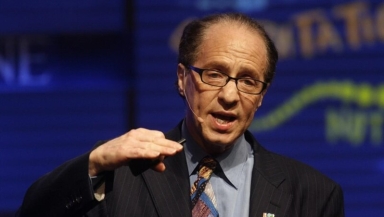
Can you imagine yourself being a half-robot in the near future, doing Internet searches just using your brain and backing up memories like computer data? Ray Kurzweil, the engineering director of search giant Google, sees this happening in the next 15 years.
At the Exponential Finance Conference on June 3, Kurzweil, a known futurist and inventor, predicted that human beings will become artificially intelligent cyborgs by the year 2030.
"Our thinking then will be a hybrid of biological and non-biological thinking... We're going to gradually merge and enhance ourselves. In my view, that's the nature of being human — we transcend our limitations," Kurzweil said during the conference.
In particular, the Google executive foresees that human brains will be able to connect directly in a cloud with thousands of computer that will augment existing human intelligence.
He also thinks emails can be sent directly to the human brain soon, and that thoughts and memories can also be backed up like computer data.
How exactly will this happen? Kurzweil predicted the development of so-called "nanobots," or tiny robots made from human DNA strands.
"Twenty years from now, we'll have nanobots, because another exponential trend is the shrinking of technology... "They'll go into our brain through the capillaries and basically connect our neocortex to a synthetic neocortex in the cloud," the Google executive said.
He added that it is part of human nature to "transcend our limitations."
Not everyone, however, is impressed with Kurzweil's prediction. Psychologist Robert Breezing, for instance, said the Google executive's theories are "at odds with biology" and may be considered "anti-biological fantasy."
"This always lead to magical thinking and false beliefs. Kurzweil is the same guy who believes that he can bring his father back from the dead. That will not happen," Breezing said.













